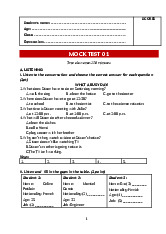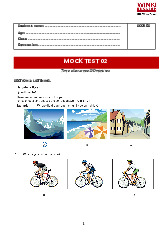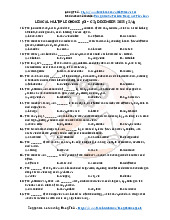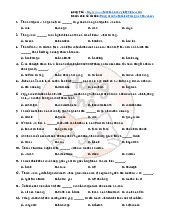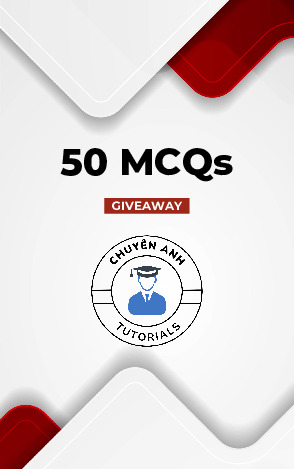





Preview text:
PRACTICE TEST
Read the text below and think of the word which best fits each space POST IN HISTORY
Although it may 0) come as a surprise to many people, postal services have existed in various parts of the
world for thousands of years. There is ample evidence to suggest that (1)……………..the Assyrians and
Babylonians had postal services. In China, a regular postal service was established in the seventh century
BC. which attained such a high level of efficiency (2)………………. the centuries that, some 2,000 years after
its institution, it was winning the admiration of European explorers like Marco Polo. Efficient postal services
were also established in the Persian and Roman empires, (3)…………………these services were mainly
confined to members of the state; private citizens had to make (4)……………with slaves and merchants to
deliver their correspondence. In medieval Europe, official postal services were organized by emperors and the
papacy. 5) as in ancient times, though, private citizens continued to entrust their correspondence (6)
…………….various travellers. It wasn’t until the fourteenth century AD that merchants - those private citizens
with the greatest need for a speedy and regular exchange of correspondence - began to (7)…………… up
regular courier services. The needs of business led to the development of the postal service (8)…………. we know it today.
Fill in one of the prepositions or adverbs below. •beneath •off •up to •in for •in with •down on •on •down with •into
1. She feels it is……………………her to socialize with uneducated people.
2. As a vegetarian, Paul is ,…………………………..people who eat meat.
3. He’ll be………………………it when his parents discover he took the money.
4. Half the staff are…………………..the flu this week.
5. She doesn't eat crisps or chocolate; she’s………………..healthy food.
6. Our dog has been………………….. its food for days now.
7. Do you know what’s………………………at the cinema tonight?
8. I don’t know what he’s been…………………but he looks very embarrassed.
Fill in the correct preposition(s) or adverb
1. The Prime Minister said that he would speak to his advisors and then act……………….their advice.
2. You can’t change your mind now. It’s too late to back…………the deal.
3. The plant manager answers directly………………………the head of the company.
4. I was prepared to back…………………her story because I knew it was the truth.
5. The baby has been acting…………………all day. I think she must be teething.
6. The accused will answer………………….his actions in the highest court in the land.
7. Faced with such formidable opposition to his proposal, he had no choice but to back………………
8. I was always in trouble for answering……………………………when I was at school.
9. If you can bear…………………me a little longer. I’ll try to explain the reasons behind our actions.
Fill in the blanks with one of the idioms/fixed phrases all but all in all told for all of all people all along all the same
all in all for all I know for all I care
take sth into account on account of
on no account on this/that account on the air in the air up in the air clear the air be up in arms on the alert held in abeyance
be of/have no fixed abode out and about in the abstract of its own accord
agree to differ/disagree in arrears cast aspersions cost an arm and a leg be thrown off balance on the ball below the belt
be beside oneself with anger/excitement bide one's time in the black blaze a trail on the blink go by the board cut to the bone out of bounds
pick someone’s brain(s) *
1. ………………………………….it seemed to be quite a good suggestion.
2. He promised to come to the party on Friday;………………………………………., I don't think we should count on him.
3. ………………………………..his hard work, he didn’t get a promotion.
4. I don’t know how they found out, but they’ve known about it…………………………………….
5. I’ve been reading this newspaper for ten years……………………………………….
6. She told me her name was Joan but………………………………………..…….she could be lying.
7. I don’t think I’ll go out tonight. I’m………………………………………………..
8. I never expected you……………………………………to say such a thing!
9. You can take the whole lot……………………………… **
1. The fire fighters are always………………………………for forest fires, particularly in the summer.
2. Here’s a feeling of anticipation…………………………………………at the moment.
3. The villagers are………………………………………………….about the proposed motorway.
4. I haven’t been able to travel much lately…………………………………my car having broken down.
5. His future is still…………………………….; he can’t decide whether to become a surgeon or a psychiatrist.
6. You must………………………….his educational background…………………when deciding what work to give him.
7. The meeting tomorrow is very important;……………………………….. should you be late.
8. There’s been a hurricane in Manila, and all flights have been cancelled……………………………
9. You can’t go into the studio just yet as the programme is still…………………………………… ***
1. If you………………………until the market improves, you’ll get a better return on your investment.
2. Doctors in World War II………………………………………………..in plastic surgery techniques.
3. Ben’s dreams of a university education………………………..when…………………..his father died
and he was forced to earn a living.
4. The swimming pool is……………………………to all pupils unless accompanied by a teacher.
5. A holiday in the UK………………………………………………………………….these days.
6. My TV has been………………………………………all week. I’ll have to call a repairman.
7. Households that are more than six months……………………………………..with their mortgage
repayments will face repossession of their homes.
8. You don’t need to worry. This kind of rash will usually clear up ………………………………
9. Costs must be…………………………….if the company is to survive the economic downturn.
10. It’s nice to see him…………………………………………again after his illness.
Fill in the blanks with the correct preposition.
1. The child showed no animosity……………………………her new stepbrother
2. What you’re saying amounts…………………………..blackmail
3. Your calculations do not accord………………………..mine.
4. She was very appreciative……………………………all the support she got from her friends.
5. I was totally abashed……………………………..my mistakes
6. His abstinence…………………………….caffeine lasted only two months.
7. I have an aversion……………………..spiders
8. The tourists bartered………………..the souvenirs at the local market.
9. When the children arrived at the fair, they made a……………………….beeline the ghost train.
10. The cat basked………………….the warm sunshine
Choose the correct item.
1. During winter the shelters are full of people of no fixed……………………. A. residence B. residence C. home D. domicile
2. Until your finances are in the……………….., it’s not a good idea to take out a loan. A. credit B. funds C. profit D. black
3. The matter has been left in……………………..until the legal ramifications have been explored. A. recess B. suspension C. abeyance D. waiting
4. It was an extremely hostile article which cast…………………..on the conduct of the entire cabinet. A. criticism B. aspersions C. disapproval D. abuse
5. Could I pick your…………………..on the subject before the meeting? A. brains B. mind C. head D. intellect
6. I’m not sure I can answer that. I’ve only thought about it in the……………….before. A. general B. hypothetical C. indefinite D. abstract
7. You'll never convince me! We’ll just have to………………………to differ. A. agree B. consider C. admit D. consent
8. The entire staff was thrown off…………………………………..by the announcement of the takeover. A. composure B. disarray C. stable D. balance
Choose the correct item.
1. A small dog went for my ankles but I adroitly managed to dodge/shirk/slip/duck it.
2. We all have to work harder because he’s always evading/ducking/shirking/dodging his duties.
3. The Prime Minister managed to shirk/dodge/ duck/evade any tricky questions.
4. The damp has affected/swayed/influenced/ impressed his health; he’s got rheumatism.
5. I’m sure that living with a vegetarian has swayed/influenced/affected/impressed me to eat less meat.
6. Before I pay for the painting, I need proof that it is a(n) real/valid/authentic/natural Picasso, not a copy.
7. He may appear to be authentic/natural/genuine/real but in fact he’s a compulsive liar.
8. If you have stomach problems it is best to avoid rich/extravagant/affluent/lavish food.
9. I was rather embarrassed when John gave me such a(n) well-off/extravagant/rich/affluent gift.
10. The country derives the majority of its revenue from one stock/ware/merchandise/commodity- coffee. COLLOCATIONS
Fill In artificial, false. ………….teeth ………….passport ………….alarm ………….beard ………….note ………….limbs ………….light ………….flowers ………….belief ………….pearls ………….impression ………….additives
Read the text below and decide which answer (A, B. C or D) best fits each gap. A VOLTE FACE
It has long been the mantra of health gurus, everywhere that animal fats were, quite literally, a (1)
………….sin. The general public received many a (2) …………. warning from the medical establishment that
animal fats directly contributed to high levels of blood cholesterol, which is a major contributor to
arteriosclerosis and heart disease.
Guidelines were produced (3) …………. such advice as: avoid eating more than a couple of eggs a week, stick
(4) …………. low-fat dairy products and (5) …………. fatty meat products to an absolute minimum.
But all of this well-meaning advice has been (6) …………. out of the water by new findings that suggest that
there is, in fact, no connection whatsoever between the cholesterol content of food and how cholesterol is
produced in the blood (7) ………….. Diet is but one of a considerable number of factors, the most important
being the (8) ………….effects of other lifestyle choices, such as whether you smoke or drink, and how much exercise you get. 1. A. lethal B. killer C. deadly D. fatal 2. A. stern B. rigid C. hard D. rough 3. A. increasing B. stretching C. prolonging D. extending 4. A. by B. in C. to D. at 5. A. have B. keep C. let D. hold 6. A. blown B. shattered C. torn D. exploded 7. A. canal B. flow C. stream D. course 8. A. unified B. assembled C. motley D. cumulative
Read the text below and think of the word which best fits each space. Use only one word in each space. SLEEP
Are you one of those people who toss and turn all night unable to get to sleep? Although many people who
have sleeping problems, either chronic or occasional, automatically reach for sleeping pills when they sense a
of them, a number turn to natural remedies, which are not only the long run. Most poor sleepers will, at some
point, have tried the difficult night (1) …………. cheaper but safer (2) ………….well-known trick of
consuming a hot drink such as milk before going to bed. But (3) ………….aware of the more unusual folk
remedies that can help them (4) ………….are their way to a restful night’s sleep. One effective remedy
involves running very cold water over the forearms and lower legs for by the warmth of the bed relaxes the
body and leads to drowsiness. Another unusual approach has to do with eating – or, (6) ………….precisely,
chewing. Eating an apple just before bedtime, taking particular care to chew the peel slowly and thoroughly,
can help eyelids droop. The reason? Apple peel contains a natural substance which induces relaxation. Not
only that, the chewing action is relaxing in (7) …………. Other than that, meditation, stretching, reading and
even walking around prove helpful for many people. In short, there are many ways to avoid the pill-popping
route. And if all (8) ………….always try counting sheep!
Read the text below. Use the word given in capitals at the end of some of the lines to form a word
that fits in the space in the same line. INTERPRETING HISTORY
One of the most common problems students face in learning to become thoughtful readers of historical
narrative is ridding themselves of the desire to find the one ‘right’, the one essential fact, the one (1. authority)
……………………………..interpretation. These problems are, of course, deeply rooted in the way textbooks
present history; as a (2. succeed)……………….. of facts marching straight to a settled outcome. To overcome
these problems requires teaching students to look at more than one source; to use the rich (3. vary)
………………………of historical documents available that present alternative accounts, voices, and (4. look)
…………………….on the past. Because history is a dialogue amongst historians not just about what events
took place in the past, but about how and why those events (5. fold)…………………….., what we know and
believe about the past constantly changes. Because of this, some philosophers argue that history is too (6.
subject)…………………………to be of much value. But absolute truth is a rare commodity in this world. It is
no less available from history than it is from other academic fields, like science. (7. conscience)
……………………….historians are aware of the pitfalls in their search for historical truth and try to avoid
them. Likewise, students of history who are aware of the subject’s inherent (8. limit)……………………are
better prepared to study and interpret it.
